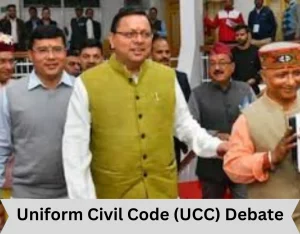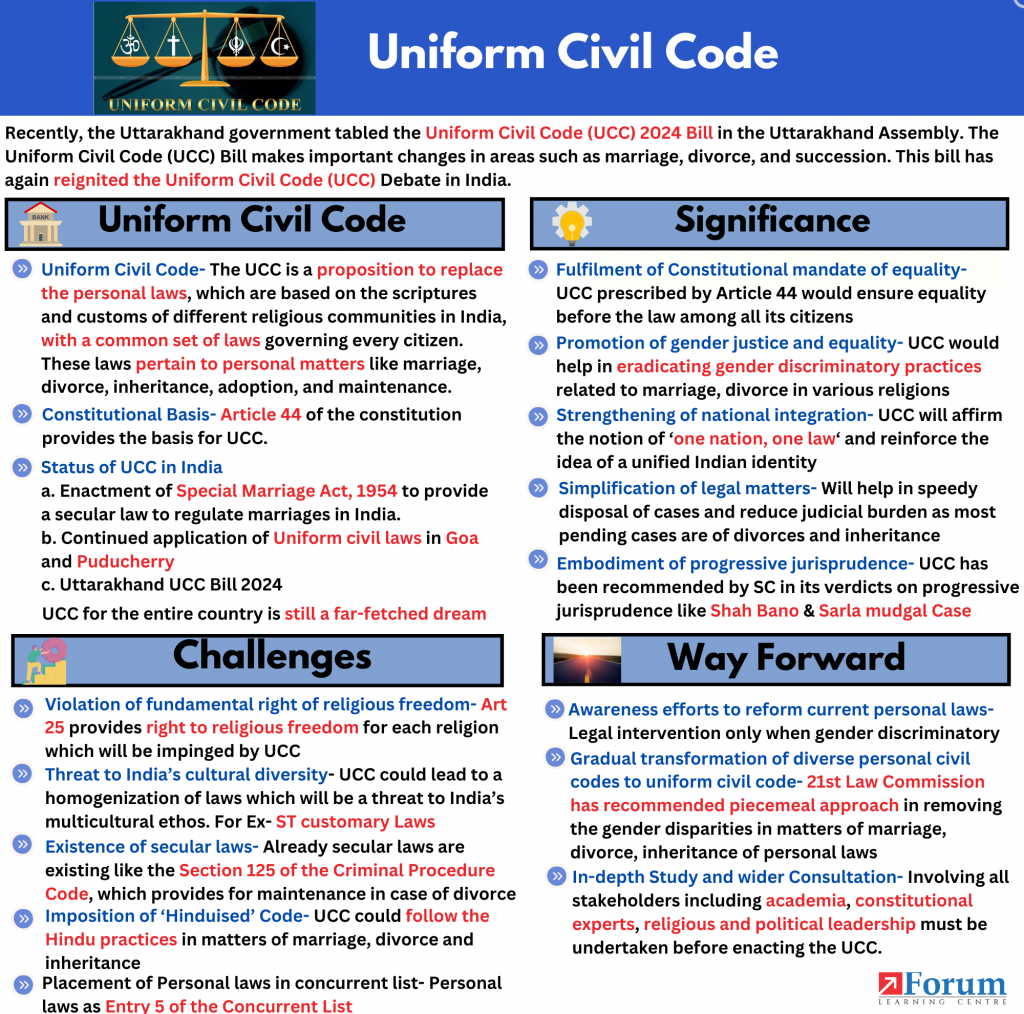
Recently, the Uttarakhand government tabled the Uniform Civil Code (UCC) 2024 Bill in the Uttarakhand Assembly. The Uniform Civil Code (UCC) Bill makes important changes in areas such as marriage, divorce, and succession. This bill has again reignited the Uniform Civil Code (UCC) Debate in India.

Key Changes in The Uttarakhand Uniform Civil Code (UCC)
| Key Changes for Muslims in the Uttarakhand UCC 1. Minimum age of marriage- Uttarakhand UCC brings the minimum age of marriage to 18 and 21 for Muslim women and men, respectively. This makes it at par with the minimum age of marriage provided in the Hindu Marriage Act, 1955 and the Special Marriage Act, 1954. 2. Succession- Under the Uttarakhand UCC, the two types of succession- testamentary succession (through a will) and intestate succession (in the absence of a will) have been brought at par with the provisions of the Indian Succession Act, 1925. a. Testamentary Succession- In case of testamentary succession (through a will), there is no restriction on how much of the property a deceased can bequeath, or to whom. Earlier, in case of testamentary succession, Muslims could bequeath up to one-third of their property to anyone of their choosing through a will and the rest two-third were to be divided in the manner provided in the Quran and the Hadith. b. Intestate succession- In case of intestate succession (without a will), the provisions of Indian succession act will be applicable. The priority in inheritance will be accorded to Class-1 heirs, who include the children, the widow and parents among a long list of others. In the absence of Class-1 heirs, the property will pass on to Class-2 heirs, who include siblings, nieces, nephews and grandparents, among others. If no such heir exists, anyone most closely related to the deceased person may receive the property. 3. Ban on practices like bigamy or polygamy and Nikah Halala- The new UCC outlaws and criminalises the practice of polygamy, Nikah Halala and Iddat which are practised under the Muslim personal laws. |
| Key Changes for Hindus in the Uttarakhand UCC 1. Abolition of distinction between ancestral and self-acquired property- Under the new UCC Bill, a father is free to dispose both his self acquired property as well his ancestral property. Earlier, a father could only dispose his self acquired property and not his ancestral property because of coparcenary rights. Coparcenary rights in the ancestral property provided by the Hindu Succession Act have been abolished as part of the UCC Bill (Coparceners- his son/daughter, grandson/granddaughter, great-grandson/great-granddaughter, who had rights in the ancestral property). 2. Changes in intestate succession- Elevation of both parents– mother and father– as Class I heirs in case of intestate succession. Earlier, only mother was included in class I heir. Now, the inclusion of father in class I heir means that a person’s property could travel to his siblings through his parents. This change has been effected to bring parity in intestate succession as Hindu law does not include siblings as legal heirs, which were included in the shariat law. |
| Other Key Changes 1. Registration of Live-In Relationships- All live-in relationships will have to be registered with the registering authority notified under the law. If any of the partners is less than 21 years old, the registrar will inform the parents of the couple and forward the registration to the local police station. Children born out of live-in relationships will have all legal rights. If one of the partners is married, will not be allowed 2. Mandatory registration of marriage- Every marriage has to be registered within 60 days. Three months jail term and fine of ₹25,000 will be awarded for wrong information during marriage registration and ₹10,000 fine for not registering the marriage. 3. Divorce only through courts- No marriage can be dissolved without a court order. In case of violation, there would be punishment of up to 3 years in jail. |
What is Uniform Civil Code (UCC)? What is The Status of UCC in India?
Uniform Civil Code- The UCC is a proposition to replace the personal laws, which are based on the scriptures and customs of different religious communities in India, with a common set of laws governing every citizen. These laws pertain to personal matters like marriage, divorce, inheritance, adoption, and maintenance.
Constitutional Basis of UCC- The concept of UCC is enshrined in Article 44 of the Indian Constitution. The implementation of UCC falls under the Directive Principles of State Policy
Status of UCC in India- The need for UCC was debated in the constitutional assembly. After long deliberation, it was decided to place UCC under the DPSP. Since the adoption of constitution, government has made certain efforts towards implementation of UCC.
| Enactment of Special Marriage Act, 1954 | The Special Marriage Act,1954 was enacted to provide secular alternative in marraiges. The inheritance rights of the offsprings of couples married under the act were to be governed by the religion-neutral chapter on inheritance in the Indian Succession Act of 1925. |
| Continued application of Uniform civil laws in Goa and Puducherry | Goa Civil Code/Goa Family Law- With the libaration of Goa, from Portuguese rule, Parliamentary law was enacted for continued application of the Portuguese Civil Code of 1867. Puducherry- In Puducherry, a sizable section of citizens called Renoncants (Indians whose ancestors had during the French rule abandoned personal law) are still governed by the 218-year old French Civil Code of 1804. |
| Uttarakhand UCC | In 2024, Uttarakhand government has tabled the UCC Bill to govern the civil spheres of marriage,divorce of persons belonging to different religions |
UCC for the entire country is still a far fetched dream- Most aspects related to marriage and divorces of persons belonging to different religions are continued to be governed by personal laws. For ex- Hindu Marriage Act (1955), a Muslim Personal Law (Shariat) Application Act (1937), a Christian Marriage Act (1872) and a Parsee Marriage and Divorce Act (1937).
What Arguments do Proponents give in Support of Implementing UCC?
1. Fulfilment of Constitutional mandate of equality- Proponents argue that it is a constitutional mandate to work towards a UCC, which is prescribed by Article 44 of the DPSP. This would ensure equality before the law among all its citizens, irrespective of their religion, class, caste, gender.
2. Promotion of gender justice and equality- UCC can help eradicate discriminatory practices related to marriage, divorce, and inheritance in various religious personal laws. For ex- Even though Hindu Succession Act, 1956 was amended in 2005 to give daughters equal inheritance rights at par with sons, but similar reforms have not been adopted universally across all personal laws.
3. Strengthening of national integration- UCC will affirm the notion of ‘one nation, one law‘. This will reinforce the idea of a unified Indian identity amidst its diverse population.
4. Societal reforms- UCC will remove the patriarchal notions of the society in all religions. For ex- Ending the subdued status of women in the religious sphere.
5. Simplification of legal matters- UCC will simplify the cumbersome legal matters governed by different personal laws. It will also help in speedy disposal of cases and reduce burden on the judiciary. For ex- Most of the cases pending cases in the judiciary pertain to the divorce, inheritance issues of persons belonging to different personal laws.
6. Reflective of progressive jurisprudence- UCC is an embodiment of the progressive jurisprudence exercised by the SC in matters related to gender and inter-religious equality. For ex- In cases like Shah Bano case (1985) where SC allowed the grant of maintenance to divorcee woman, Shaira Bano case (2017) where SC banned the disriminatory practice of triple talaq.
7. Precedent of Goa’s Civil Code- Proponents of the UCC cite the example of successful implementation of UCC in Goa where the civil laws of all Goans, irrespective of religion is governed by a Uniform Civil Code.
What are The Critics Arguments Against the Uniform Civil Code?
1. Violation of fundamental right of religious freedom- Critics argue that the UCC infringes upon the right to religious freedom provided by Article 25 of the constitution. Also, UCC infringes upon the right of communities to preserve their distinct culture granted by Article 29 of the constitution.
2. Diverse personal laws and customary practices in India- Enforcing uniformity will interfere with the diverse personal laws and customary practices followed in India by different communities. For ex- Special Marriage Act, 1954 (A Secular Law) prohibits marriage between first cousins, which is a common practice in some communities in India. Marriage between second cousins is a popular practice among the Hindu communities in South India.
3. Threat to India’s cultural diversity- UCC could lead to a homogenization of laws. This will be a threat to India’s multicultural ethos. For ex- Different religious and cultural practices followed by Scheduled tribes in India.
4. Existence of secular laws- Critics point to the existence of secular laws applicable to all citizens, irrespective of religion. For ex- Section 125 of the Criminal Procedure Code, which is a secular law provides for maintenance, and existence of laws relating to domestic violence like the Domestic Violence Act.
5. Imposition of ‘Hinduised’ Code- Some critics suggest that the UCC might impose a ‘Hinduised’ code on all communities. For ex- UCC could follow the Hindu practices in matters of marriage, divorce and inheritance and will legally force other communities to follow the same.
6. Placement of Personal laws in concurrent list- Some constitutional law experts argue that perhaps the constitutional framers did not intend total in uniformity in personal laws. They cite the placement of personal laws as Entry 5 of the Concurrent List (where the Parliament as well as the State Assemblies have the power to legislate).
What is the Judicial View on UCC?
| Shah Bano Case (1985) | Supreme Court directed the Government to enact a UCC. The SC observed that UCC will help the cause of national integration. |
| Sarla Mudgal Case (1995) | The Supreme Court directed the Government to reflect the steps taken towards securing a UCC for the citizens of India. |
| Pannalal Bansilal Patil v. State of Andhra Pradesh (1996) | Supreme Court observed that while a uniform law is desirable, its enactment in one go might be counter-productive to the unity and integrity of the nation. Gradual progressive change should be brought about. |
| John Vallamattom and Ors. v. Union of India (2003) | Supreme Court held that there is no necessary connection between religious and personal law in a civilized society. Matters of secular character like marriage cannot be brought within the guarantee enshrined under Article 25 and 26. |
Read More UPSC Topics-
What Should be The Way Forward?
1. Awareness efforts to reform current personal laws- This should be initiated and undertaken by the communities themselves. Legal intervention should be undertaken only if a practice violates fundamental rights of citizens (especially women).
2. Gradual transformation of diverse personal civil codes to uniform civil code- 21st law commission has recommended that a UCC is neither necesssary nor desirable at this stage. Government must take a piecemeal approach in removing the gender disparities in matters of marriage, divorce, inheritance of personal laws. Government must restrain implementing all aspects in single legislation.
3. In-depth Study and wider Consultation- An in-depth study and wider consultation involving all stakeholders including academia, constitutional experts, religious and political leadership must be undertaken before enacting the UCC. This will ensure better formulation and greater acceptability of UCC when implemented.
4. Equality between men and women in communities rather than equality between communities- 21st law commission had recommended the government to first concentrate on ensuring the equality between men and women in the same community rather than focussing on the equality between communities.
5. Prioritise basic reforms- The government must prioritise basic reforms such as a) Having 18 years as the marriageable age for girls for all across communities and genders b) Introducing a ‘no-fault’ divorce procedure and allowing the dissolution of marriage on the ground of irretrievable breakdown, and c) Having common norms for post-divorce division of assets.
Conclusion
UCC in its true spirit, must be brought about by making gradual changes. As recommended by the Law Commission, the focus should be on ending discriminatory practices against women, rather than enforcing uniformity. However, until that is done, the better course would be to bring about small reforms, correcting some inherent irrationality in some of the personal laws, and make them suitable for modern times. This will lay the foundation of implementing a nation wide UCC at a later date.
| Read More- The Indian Express UPSC Syllabus- GS-2 Indian Constitution- Significant Provisions |
Discover more from Free UPSC IAS Preparation Syllabus and Materials For Aspirants
Subscribe to get the latest posts sent to your email.








